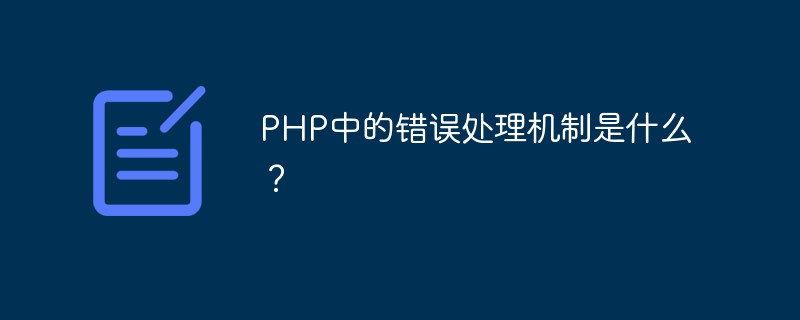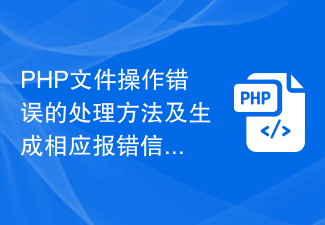
Handling fatal errors and exceptions in PHP
PHP is a scripting language widely used in server-side programming. It provides many features and functions to help us Build reliable applications. However, during the development process, we will inevitably encounter fatal errors and exceptions. This article explains how to handle these errors and exceptions and provides some sample code.
1. Fatal Error
In PHP, a fatal error is a serious type of error that will cause the script to interrupt execution. Common fatal errors include calling undefined functions, accessing non-existent classes or methods, and syntax errors. When a fatal error occurs, PHP will output the error message to the screen and log it to the error log.
In order to better handle fatal errors, we can use the register_shutdown_function() function to register a callback function to be executed after the script execution is completed. This callback function can be used to capture and handle fatal error messages. Here is an example:
function handleFatalError() {
$error = error_get_last();
if ($error && $error['type'] === E_ERROR) {
// 处理致命错误
echo "发生致命错误:" . $error['message'];
// 记录错误日志
error_log($error['message'], 1, "error.log");
}
}
register_shutdown_function('handleFatalError');
// 以下是你的 PHP 代码
// ...
In the above example, we defined a function called handleFatalError(). In this function, we use the error_get_last() function to get the last error message that occurred and determine whether its type is E_ERROR, which is a fatal error. If it is a fatal error, we can add processing logic to this function, such as outputting error information to the screen and recording the error information to the error log.
2. Exception (Exception)
In PHP, exception is a foreseeable program error. We can catch and handle exceptions through code. Exceptions are usually actively thrown by our own code, such as checking whether the parameters are legal, whether the file exists, etc. In addition, PHP also provides some built-in exception classes, such as Exception, InvalidArgumentException, etc.
We can use the try..catch statement block to catch and handle exceptions. The try code block contains code that may throw exceptions, and the catch code block is used to handle caught exceptions. Here is an example:
function divide($a, $b) {
try {
if ($b === 0) {
throw new Exception("除数不能为0");
}
return $a / $b;
} catch (Exception $e) {
// 处理捕获到的异常
echo $e->getMessage();
}
}
// 调用函数
echo divide(10, 2); // 输出 5
echo divide(10, 0); // 捕获到异常,输出 "除数不能为0"In the above example, we defined a divide() function to calculate the quotient of two numbers. In the function, we use the throw statement to throw an Exception exception when the divisor is 0. In the catch code block, we can catch this exception and handle it accordingly, such as outputting exception information.
It is worth noting that there can be multiple catch clauses in the catch code block, and each clause can catch different types of exceptions. In this way, we can handle different types of exceptions differently.
Conclusion
Through the above sample code, we learned how to handle fatal errors and exceptions in PHP. For fatal errors, we can use the register_shutdown_function() function to capture and handle error information. For exceptions, we can use the try..catch statement block to catch and handle exceptions. Properly handling these errors and exceptions can improve the stability and reliability of our applications.
The above is the detailed content of Handling fatal errors and exceptions in PHP. For more information, please follow other related articles on the PHP Chinese website!
 PHP中的错误处理机制是什么?May 12, 2023 pm 07:31 PM
PHP中的错误处理机制是什么?May 12, 2023 pm 07:31 PMPHP是一种流行而强大的服务器端编程语言,可以用来开发各种Web应用程序。就像其他编程语言一样,PHP也有可能会出现错误和异常。这些错误和异常可能由各种原因引起,如程序错误、服务器错误、用户输入错误等等。为了确保程序的运行稳定性和可靠性,PHP提供了一套完整的错误处理机制。PHP错误处理机制的基本思想是:当发生错误时,程序会停止执行并输出一条错误消息。我们可
 如何处理 PHP 中的语法错误Aug 07, 2023 pm 04:46 PM
如何处理 PHP 中的语法错误Aug 07, 2023 pm 04:46 PM如何处理PHP中的语法错误引言:在开发PHP程序时,经常会遇到语法错误的情况。语法错误是由于代码违反了PHP语法规则所引起的,它会导致脚本无法正确执行。本文将介绍一些处理PHP语法错误的方法,并提供相应的代码示例。使用错误提示功能PHP提供了丰富的错误提示功能,在开发过程中可以打开这些提示,以便及时发现和解决语法错误。可以通过设置erro
 PHP文件操作错误的处理方法及生成相应报错信息Aug 08, 2023 am 10:30 AM
PHP文件操作错误的处理方法及生成相应报错信息Aug 08, 2023 am 10:30 AMPHP文件操作错误的处理方法及生成相应报错信息在使用PHP进行文件操作时,可能会遇到各种错误,如找不到文件、权限错误等。这些错误可能会导致程序无法正常运行,因此合理处理文件操作错误是非常重要的。本文将介绍PHP文件操作错误的处理方法,并展示如何生成相应的报错信息。一、错误处理方法使用错误控制运算符PHP提供了错误控制运算符“@”,可以在执行可能出错的语句前添
 如何处理PHP文件路径错误并生成对应的报错信息Aug 06, 2023 am 10:12 AM
如何处理PHP文件路径错误并生成对应的报错信息Aug 06, 2023 am 10:12 AM如何处理PHP文件路径错误并生成对应的报错信息在开发和维护PHP应用程序时,经常会遇到文件路径错误的情况。当引用一个不存在的文件或者指定了错误的路径时,在PHP中会抛出一个致命错误,导致应用程序无法正常运行。为了更好地调试和处理这种情况,我们可以通过以下方式来处理PHP文件路径错误,并生成对应的报错信息。使用绝对路径在引用文件时,尽量使用绝对路径而不是相对路
 解决PHP报错:调用未定义的类方法Aug 18, 2023 pm 05:09 PM
解决PHP报错:调用未定义的类方法Aug 18, 2023 pm 05:09 PM解决PHP报错:调用未定义的类方法在进行PHP开发过程中,经常会遇到调用未定义的类方法的报错。这种情况一般是由于代码编写不规范或者使用的类方法不存在而导致的。下面我们将介绍一些解决该问题的常见方法。检查类方法是否存在当报错提示调用未定义的类方法时,首先要检查该方法是否存在于对应的类中。通过使用method_exists()函数可以检查某个类是否存在某个方法。
 如何进行PHP后端功能开发的错误处理?Aug 04, 2023 pm 01:19 PM
如何进行PHP后端功能开发的错误处理?Aug 04, 2023 pm 01:19 PM如何进行PHP后端功能开发的错误处理?作为一名PHP后端开发人员,在开发过程中,我们经常会遇到各种错误。良好的错误处理是保证系统稳定性和用户体验的重要因素。在本文中,我将分享一些如何进行PHP后端功能开发的错误处理的方法和技巧,并提供相应的代码示例。设置错误报告级别PHP提供了一个错误报告级别参数,可以通过设置来定义要报告的错误类型。使用error_repo
 PHP 错误处理:最佳实践和建议Aug 07, 2023 pm 12:25 PM
PHP 错误处理:最佳实践和建议Aug 07, 2023 pm 12:25 PMPHP错误处理:最佳实践和建议在编写PHP代码时,错误处理是一项非常重要的任务。如果不正确地处理错误,就会导致应用程序中的漏洞和安全问题。同时,良好的错误处理还有助于提高代码的可维护性和可扩展性。本文将介绍一些PHP错误处理的最佳实践和建议,并提供一些代码示例。使用异常处理在PHP中,异常是一种用于处理运行时错误的机制。通过使用异常,可以将错误
 小程序开发中的PHP错误处理与异常日志记录Jul 04, 2023 am 11:16 AM
小程序开发中的PHP错误处理与异常日志记录Jul 04, 2023 am 11:16 AM小程序开发中的PHP错误处理与异常日志记录随着小程序的不断普及,越来越多的开发人员开始使用PHP语言来开发小程序后台。在开发过程中,错误处理和异常日志记录是至关重要的。本文将介绍在小程序开发中如何处理PHP错误和记录异常日志,并给出相应的代码示例。一、PHP错误处理错误报告设置在PHP中,我们可以通过修改error_reporting和display_err


Hot AI Tools

Undresser.AI Undress
AI-powered app for creating realistic nude photos

AI Clothes Remover
Online AI tool for removing clothes from photos.

Undress AI Tool
Undress images for free

Clothoff.io
AI clothes remover

AI Hentai Generator
Generate AI Hentai for free.

Hot Article

Hot Tools

SublimeText3 Chinese version
Chinese version, very easy to use

SublimeText3 Mac version
God-level code editing software (SublimeText3)

MantisBT
Mantis is an easy-to-deploy web-based defect tracking tool designed to aid in product defect tracking. It requires PHP, MySQL and a web server. Check out our demo and hosting services.

Dreamweaver CS6
Visual web development tools

DVWA
Damn Vulnerable Web App (DVWA) is a PHP/MySQL web application that is very vulnerable. Its main goals are to be an aid for security professionals to test their skills and tools in a legal environment, to help web developers better understand the process of securing web applications, and to help teachers/students teach/learn in a classroom environment Web application security. The goal of DVWA is to practice some of the most common web vulnerabilities through a simple and straightforward interface, with varying degrees of difficulty. Please note that this software






